
Mt. Pilatus self-guided trip winter by cable car and aerial cableway from/to Kriens
Validity: All day
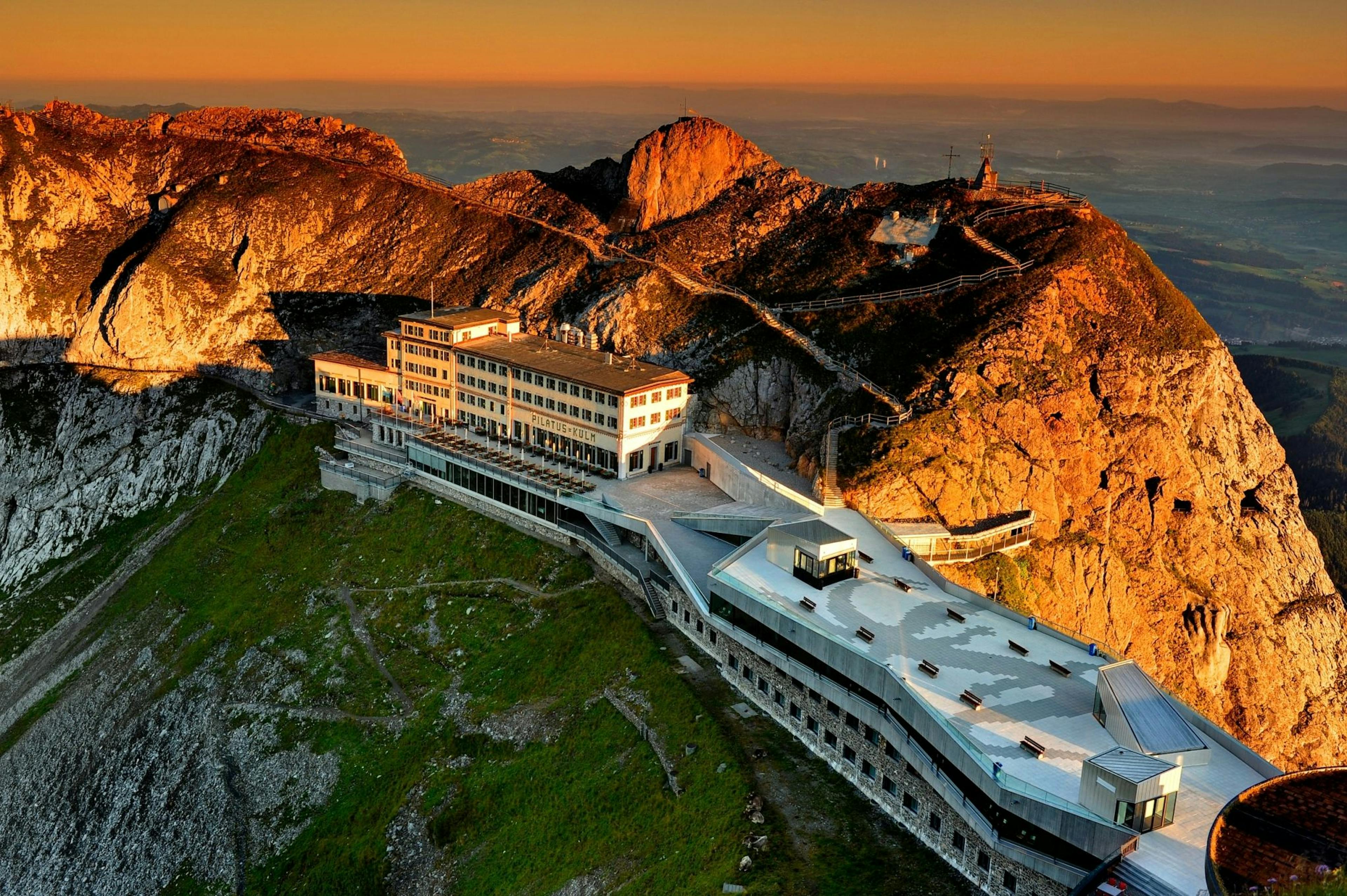
7 Activities
Filter
Better than 4.5 stars
Better than 4 stars
Better than 3.5 stars
Better than 3 stars
No Rating

Validity: All day

Duration: 6 hours
Why book with Swiss Activities?
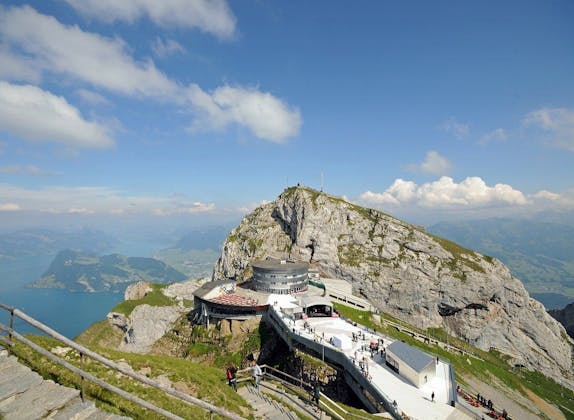
Duration: 5:30 hours

Duration: 9:30 hours

Duration: 6 hours

Duration: 12 hours
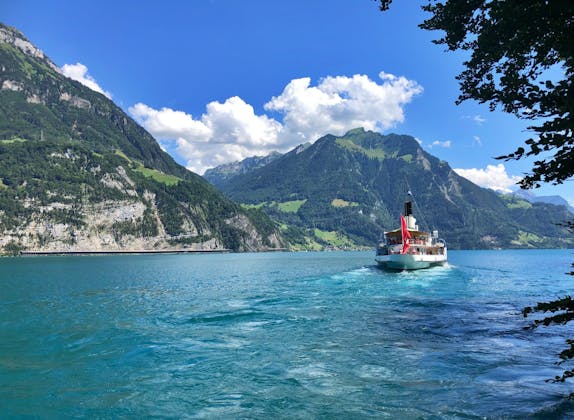
Validity: All day

Ticket
booked 4,221 times

Tour
Duration: 6 hours
booked 20 times
Why book with Swiss Activities?

Tour
Duration: 5:30 hours
booked 16 times
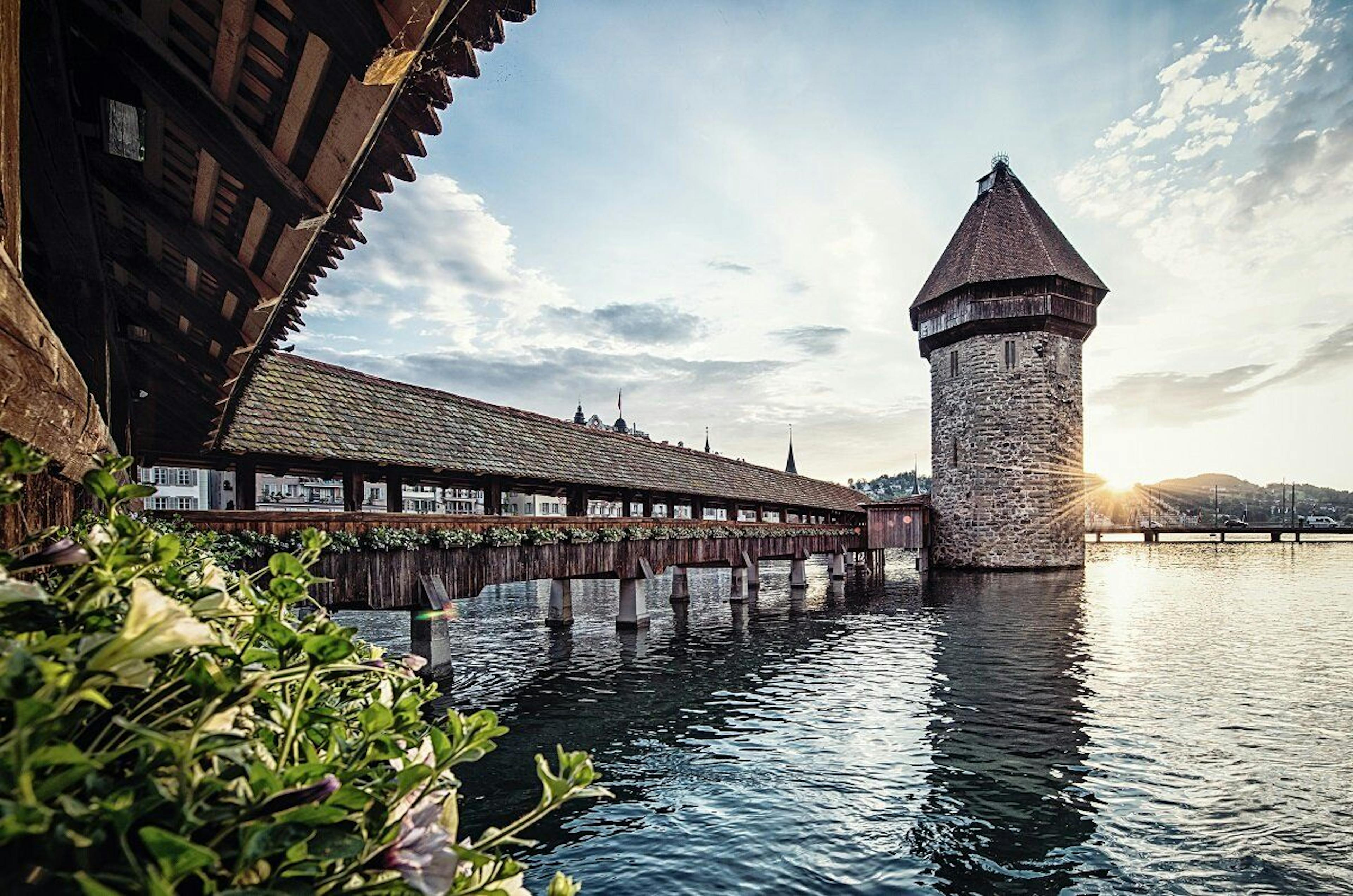
Tour
Duration: 9:30 hours

Tour
Duration: 6 hours
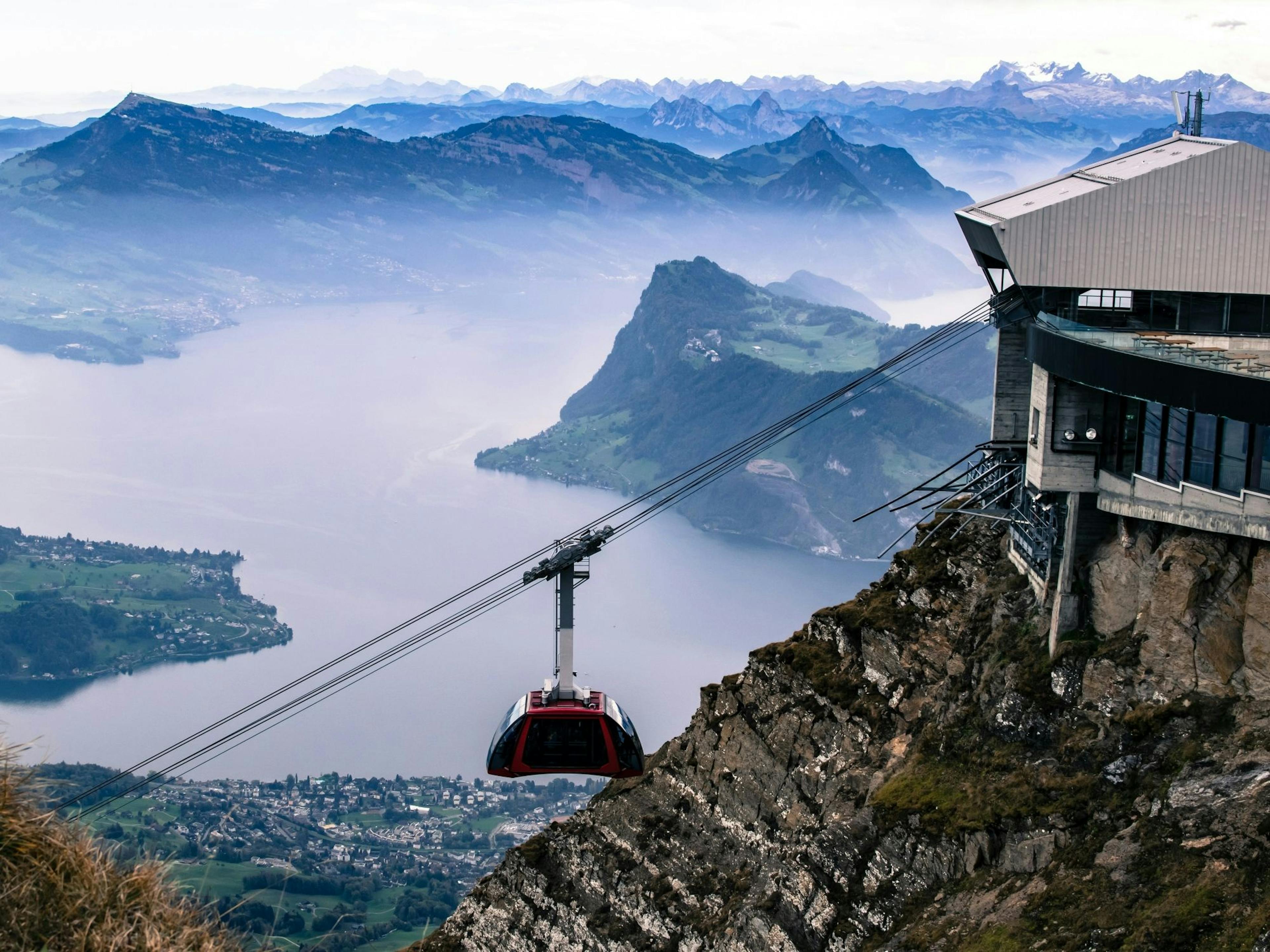
Tour
Duration: 12 hours

Passports
Sometimes the view goes over the Jura to the Black Forest. Other times, only a sea of clouds or fog is visible, which perfectly matches the myth of the mountain. Many old legends revolve around the Pilatus massif. With it, people sought an explanation for the frequent, sudden and violent storms on the mountain
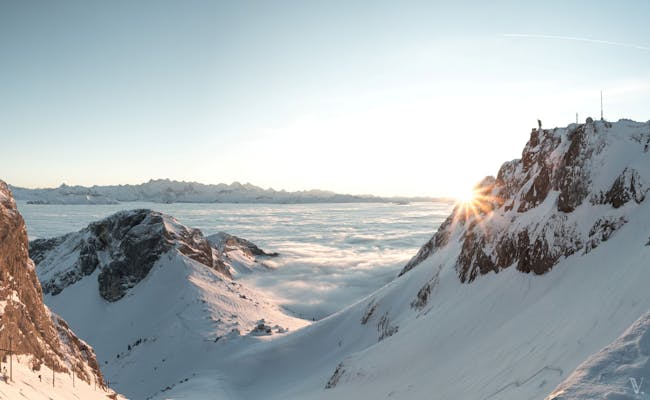 Pilatus Sonnenuntergang Winterstimmung (Foto: (c) PILATUS-BAHNEN AG)
Pilatus Sonnenuntergang Winterstimmung (Foto: (c) PILATUS-BAHNEN AG)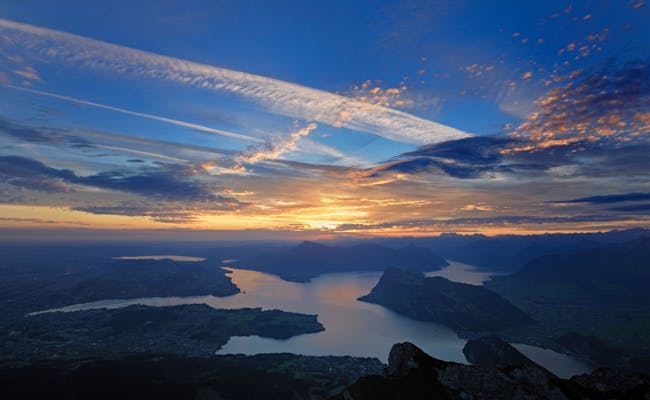 Pilatus Sonnenaufgang vom Esel (Foto: (c) PILATUS-BAHNEN AG)
Pilatus Sonnenaufgang vom Esel (Foto: (c) PILATUS-BAHNEN AG)On Mount Pilatus there are several hilltops and vantage points that allow a wide view over the lake landscape. Dragon World brings the legends of the dragon to life for families
The following sights are available on and around Mount Pilatus:
Mount Pilatus is not a mountain with a single peak. Rather, it is a mountain massif. Several vantage points can be found at Pilatus Kulm. Some of them offer a 360-degree view
The Tomlishorn is the highest mountain peak of the Pilatus massif. It is located on the outer western side of Mount Pilatus and reaches an altitude of 2,129 meters above sea level. In a hike along the flower path the viewpoint is easily accessible. The flower path goes from the Kulm to the Tomlishorn. The flowers growing here are wild. Information boards along the path provide information about the Latin names, the plant species and their flowering time. All alpine plants in the Pilatus region are protected, and not only on the flower trail. The trail is three kilometers long and climbs about 240 meters in altitude along the way. The easy trail can be walked in one to one and a half hours. It runs mostly on the south side of the main ridge. On the outer side it is secured throughout and asphalted until the last section of the trail at the Tomishorn. Steeper rock sections have stairs. Rockflowers, bellflowers, silverroot or liverwort and many other flowers can be seen. The trail is open from June - October.
The mountain peak Oberhaupt shoots to the east. It is situated 2,106 meters above sea level and is also considered a beautiful viewpoint. It can be reached in a few minutes from Hotel Pilatus Kulm. It is the third highest Pilatus peak.
The Esel is the second highest peak of the Pilatus massif and reaches 2,118 meters above sea level. It is located directly at the Hotel Bellevue in the eastern part of the Pilatus massif. The summit offers a panoramic view of Lake Lucerne and the mountains.
The Drachenweg is an adventure trail through the mountain. It starts at Pilatus Kulm. The paths are carved into the mountain and offer repeated views through holes in the rock. The hike through the world of legends on Mount Pilatus can only be walked on some days in winter. Legends about dragons were told around Mount Pilatus for a long time, and there was even talk of a lindworm. A young lad is even said to have fallen into a cave in the middle of two dragons, but they did him no harm. In spring, one of the dragons crawled out of the cave and flew away. The other dragon held his tail in the cave from the outside so that he could pull himself out.
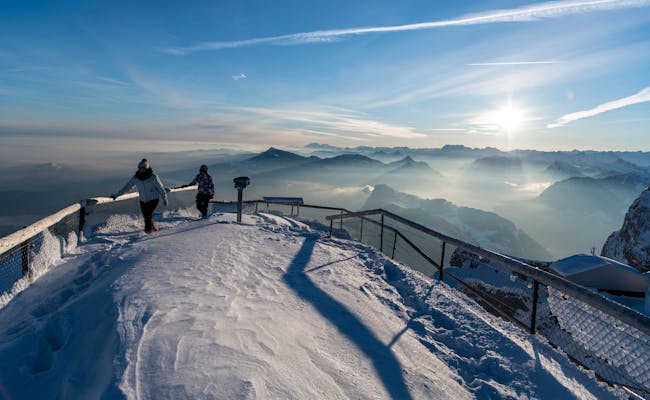 Pilatus Oberhaupt (Foto (c) PILATUS-BAHNEN AG)
Pilatus Oberhaupt (Foto (c) PILATUS-BAHNEN AG)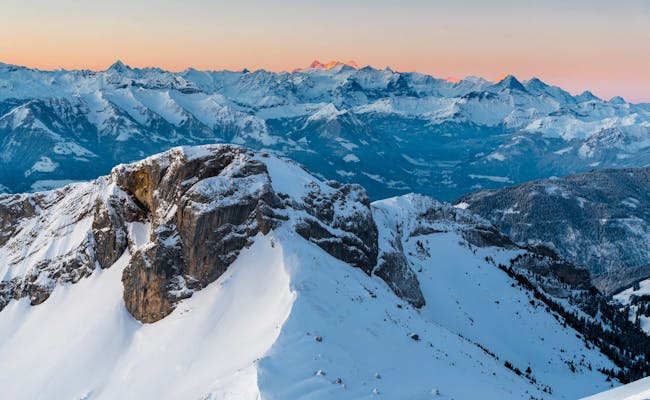 Pilatus Orange Morgenstimmung Blick Matthorn (Foto (c) PILATUS-BAHNEN AG)
Pilatus Orange Morgenstimmung Blick Matthorn (Foto (c) PILATUS-BAHNEN AG)Dragon World is located directly on Pilatus Kulm and next to the summit restaurant. Visitors experience the dragon saga on their tour. The tour is designed to be interactive. Games of skill and special effects fascinate both children and adults. Dragonworld is open in summer and winter and is perfect for a family trip.
In six acts and four legend windows the audience experiences the story about the Pilatus Dragon. First information is already available at the entrance. Then it's down the stairs into the cave landscape. Sixteen projectors are installed here, transporting people into the story world. Visitors experience the events of the 15th century in the six acts as if they were there themselves.
This is also ensured by the interactive games and effects. In three of the six acts alone, guests must actively intervene in the course of the game. In a wall game, for example, various actions are triggered by simple hand movements. Stones rumble from the cave ceiling or the dragon hisses directly at the visitor. you can also "walk over glowing coals".
The very brave navigate the dragon through Pilatusland to find the dragon stone. In this way, one's own skill becomes a component and contributes to the outcome of the story. Whoever succeeds in navigating the dragon through hoops of fire and finding the dragon stone becomes a hero in DragonWorld.
The legend windows provide background information on the dragon story. Short texts in German and English guide visitors through the story. The visit of the Dragon World is free of charge.
In the past, Mount Pilatus was not appreciated by the people of Lucerne as a local mountain. It was even forbidden under penalty of law to climb it. Terrible storms were associated with the mountain massif, which, for example, would only be triggered by stones falling into Lake Pilatus. According to legend, the body of Pontius Pilate lies in this lake.
Lake Pilatus is located at an altitude of 1548 meters on the Pilatus massif. Although the name Pilate rather comes from "mons pileatus" (mountain with rock struts), it was associated with Pontius Pilate in the Middle Ages. The legend said that the Roman governor was sunk in Lake Pilate. As soon as he was disturbed in the lake, terrible storms would arise. Until the 16th century, even entering the mountain was forbidden under penalty by the Lucerne city council. In the 14th century, six clergymen were imprisoned for trying to climb the mountain. It was not until the end of the 16th century that the dean and the town clerk went to the lake with the magistrate and some citizens to disprove the legend. They churned it up, threw stones into it and waded through the water. No storm followed. However, "to be on the safe side", the lake was subsequently drained. Today it is a watery moor.
The Drachenstein got its name after a farmer swore that he had seen a dragon land on a rock on Mount Pilatus. In the summer of 1421, according to the legend, a huge dragon flew to Mount Pilatus and crashed down so close to a farmer that he fainted from fright. When he woke up again, the dragon was gone, but there was a dragon stone lying next to coagulated blood. The healing effect of this stone was even officially confirmed in 1509. Another story says that the dragon dropped this stone when approaching Mount Pilate. The dragon stone passed from owner to owner and was purchased by the city of Lucerne in 1921. Today it can be seen in the Museum of Nature in Lucerne. A computer tomography carried out in 2006 showed that the stone is not a meteorite, as was sometimes assumed. It probably consists of clay. Its origin is still unclear.
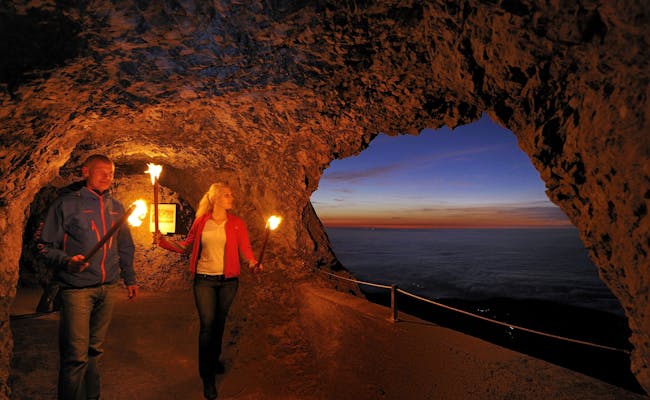 Pilatus Drachenweg (Foto (c) PILATUS-BAHNEN AG)
Pilatus Drachenweg (Foto (c) PILATUS-BAHNEN AG)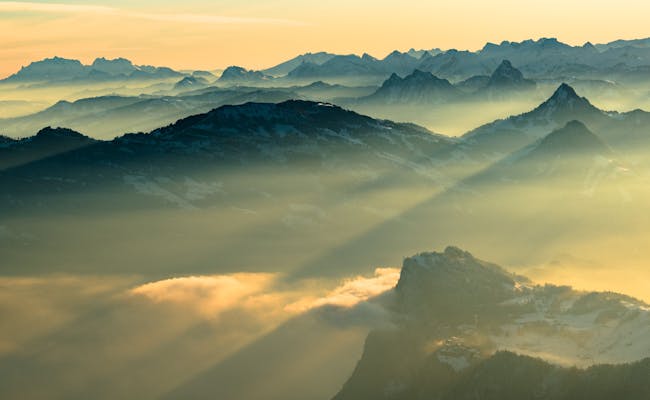 Pilatus Morgendämmerung (Foto (c) PILATUS-BAHNEN AG)
Pilatus Morgendämmerung (Foto (c) PILATUS-BAHNEN AG)The Mondmilchloch is a karst cave in the Pilatus Massif. Moon milk is the name given to the white and milky-looking calcite deposit inside the cave. It was used as a medicine and in 1555 it was introduced by Conrad Gesner into the official pharmacopoeia under the name "Lac Lunae". This remedy thus received a great notoriety. Even in the 19th century, lunar milk was recommended by doctors.
The Dominikhöhle is a large rock crevice with a "guard" in front of it. It owes its name and the story about it to a whitish rock block in the opening of the crevice. From a distance, the stone resembles a human figure with crossed legs. One could think that it is leaning on a table with its arms. Therefore, in the 18th century, people suspected that the cave hid a gold or silver treasure.
in 1814, a Tyrolean chamois hunter rappelled down into the Dominikloch. 400 locals watched the spectacle from the Bründlenalp: Treasures did not appear. The white boulders were several stone blocks covered with white calcareous sinter. In the legend, the supposed white figure was associated with St. Dominic, since he and also the Dominicans always wear a white religious robe.
A legend also says that on the Bründlenalp, which stood above the cave, there used to be a small chapel dedicated to St. Dominic. It was buried by a rockfall and ended up in the cave. The entrance to the Dominikhöhle is found in the north wall of the Widderfeld.
The stories about ghostly apparitions, horses clattering on the mountain and dragons led to fear and curiosity at the same time.
The dragon moor can be found in Krienseregg. The raised bog may not be entered. Five dragon moor platforms have therefore been set up around the protected area to provide insights into nature. Visitors experience the mosses, feel the power of the Pilatus streams and get an insight into the Ice Age. Large display boards provide information about the formation and history of the raised bog. In addition to the circular hiking trails, there is an imaginative children's playground and picnic areas. A barefoot path completes the facilities, which are suitable for children of different ages. You reach Krienseregg halfway on the panorama gondola lift, which stops here to disembark on request.
The display boards show the following contents:
The Forenmoos was formed during the last ice age and is protected today because of its national importance. In former times, putrid gases and will-o'-the-wisps in the mire contributed to the fact that even more legends grew up around Mount Pilatus.
Originally, most of the Pilatus streams flowed into the Krienbach. The streams fell steeply and thus not only had a lot of power. They also carried large amounts of bedload. Floods occurred regularly with catastrophic effects in Kriens and Lucerne. The creeks were later tamed by means of extensive creek embankments.
It is also explained why charcoal burners and harzers contributed to the destruction of forests. Large meadow areas were created for hay production, where valuable biotopes were created by the reed meadow plants that require few nutrients.
There is a lot for children to experience on Mount Pilatus: Piluland with the well-behaved dragon Pilu is a paradise for children: playground, dragon castle, dragon forest, dragon land and in between barbecue areas for their own catering. Situated on the Krienseregg, it is quickly reached by the panoramic cable car. The Pilu is not only at home here, it is the ambassador of the Pilatus cableways for young and old and can always be found around Pilatus.
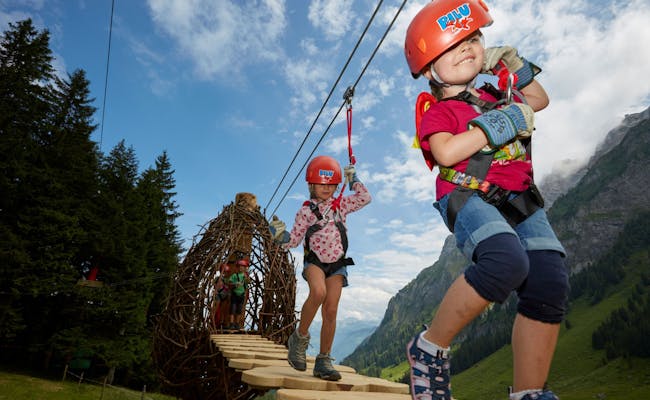 Pilatus PILU Seilpark (Foto (c) PILATUS-BAHNEN AG)
Pilatus PILU Seilpark (Foto (c) PILATUS-BAHNEN AG) Pilatus PILU Spielplatz (Foto (c) PILATUS-BAHNEN AG)
Pilatus PILU Spielplatz (Foto (c) PILATUS-BAHNEN AG)The Klimsenkapelle stands on the Klimsenhochjoch at an altitude of 1,864 meters. inaugurated in 1861, it originally belonged to the Klimsenjoch Hotel. The hotel was demolished at the end of the 1960s. The chapel was last thoroughly renovated in 2003 and is now a listed building. A mountain service is held here (weather permitting) on the third Sunday in August. The Klimsenkapelle is located between the Oberhaupt and the Klimsenhorn. It is reached in a mountain hike from Fräkmüntegg (top station of the cable car) after about 3.5 hours. On the way, some places are secured by ropes. In wet conditions it can be slippery. This hike requires absolute surefootedness and experience in mountain hiking.
From Lucerne, an excursion can be planned as a Pilatus round trip: Up the mountain by cable car, down by rack railroad, and back to Lucerne by boat. This tour is called the Golden Round Trip and is also possible in reverse. In combination with the train instead of the ship, it is called the Silver Round Trip. In winter, however, both the rack railroad and the lake cruise are on break.
Offer at Swiss Activities:
The mountain railways of Pilatus include a cogwheel train, a panorama gondola, and a cable car, the Dragon Ride.
The cogwheel train is the steepest in the world. It ascends with a gradient of 48 degrees from Alpnachstad up to Pilatus. For the 4.6 km journey, it takes about 30 minutes and overcomes an elevation of 1635 meters. At the intermediate station Amsigen, disembarkation can be requested. Boarding is only possible if there is actual space available. The cogwheel train operates from May to November.
A panorama gondola operates from Kriens to the station Fräkmüntegg. It crosses the area above Krienseregg. Kriens is located at about 500 meters above sea level, Krienseregg at 1,026 meters, and Fräkmüntegg at 1,416 meters. Opened for the first time in 1954, it was modernized in 1996. It overcomes an elevation of 899 meters and takes about 30 minutes. Each of the 132 gondola cabins can hold four people.
At Fräkmüntegg, the Dragon Ride cable car connects and travels up to Pilatus Kulm. It has two cabins, each accommodating 55 people (+1) and operating alternately up and down. Originally, a cable car was put into operation on this route in 1956 and renovated in 1983. A comprehensive modernization took place in 2015. It takes just under four minutes and overcomes an elevation of 646 meters. It generally operates every 15 minutes. Both cable cars operate year-round, excluding maintenance periods, which usually occur from the end of October to the beginning of November.
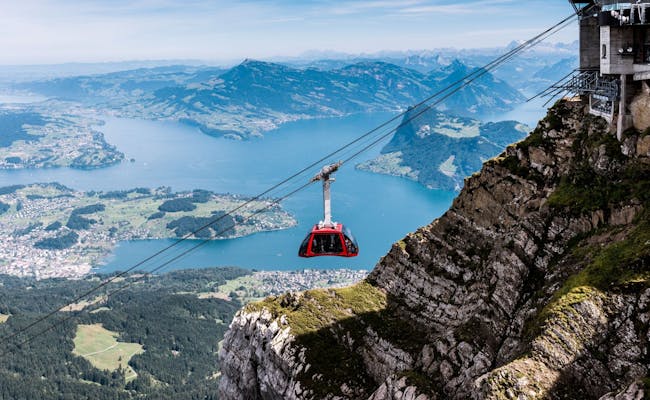 Pilatus DragonRide Sommer Vierwaldstättersee (Foto (c) PILATUS-BAHNEN AG)
Pilatus DragonRide Sommer Vierwaldstättersee (Foto (c) PILATUS-BAHNEN AG)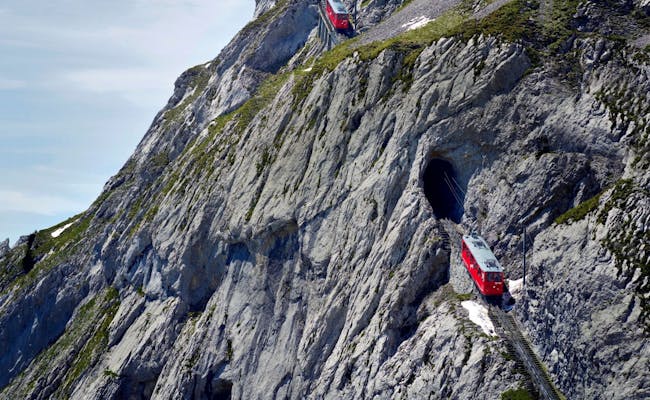 Pilatus Zahnradbahn an Eselwand (Foto (c) PILATUS-BAHNEN AG)
Pilatus Zahnradbahn an Eselwand (Foto (c) PILATUS-BAHNEN AG)In summer, people from Lucerne like to go to their local mountain, Mount Pilatus. But visitors and tourists coming from further afield also like to visit the mountain massif. Winter activities on Mount Pilatus take place largely at Fräkmüntegg down to Krienseregg. Pilatus here is wonderful for sledding and snowshoeing.
The following activities are particularly popular on Mount Pilatus:
A helicopter flight from Lucerne is one of the most extraordinary experiences at Pilatus.
In Fräkmüntegg there is a large climbing paradise for children, young people and the young at heart.
At the top station of the cable car there are various outdoor facilities for children. Safety is ensured everywhere and all the time. The children climb, balance, whiz on rope slides (Tyrolienne) through the forest.
The rope park facilities include:
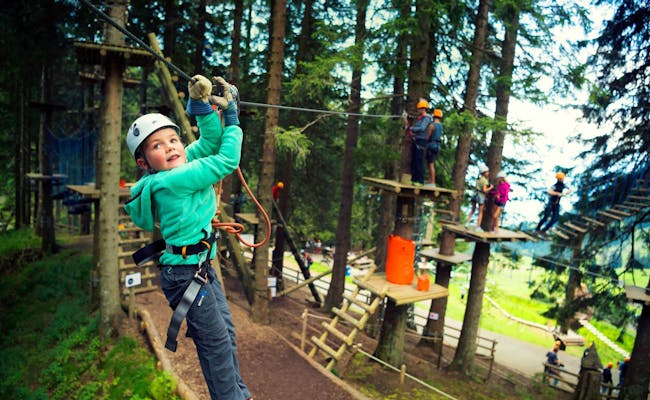 Pilatus Seilpark Fräkmüntegg (Foto: (c) PILATUS-BAHNEN AG)
Pilatus Seilpark Fräkmüntegg (Foto: (c) PILATUS-BAHNEN AG)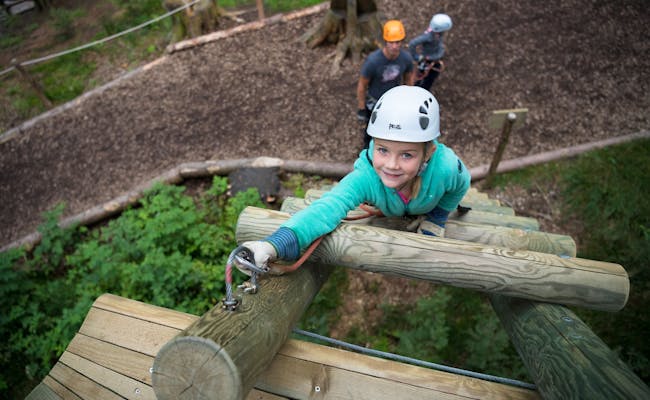 Pilatus Seilpark Fräkmüntegg (Foto: (c) PILATUS-BAHNEN AG)
Pilatus Seilpark Fräkmüntegg (Foto: (c) PILATUS-BAHNEN AG)Other facilities at Fräkmüntegg:
Mountain hikes on Mount Pilatus, with Mount Pilatus Kulm as the starting point and high-altitude hikes as circular walks: Mount Pilatus has many different trails to offer. There is always a wide view of Lake Lucerne and its surroundings.
Easy and more difficult mountain hikes lead around Mount Pilatus. Some paths are good to walk with the whole family. These include the circular hikes, which are possible as beautiful high-altitude hikes on Mount Pilatus.
The mountain massif has many peaks and the mountain chain stretches from west to east over these peaks:
From Pilatus Kulm via Fräkmünt to Ämsigen leads a path of just under ten kilometers, which with 361 meters of ascent as a rather easy path is also possible with Kinderb. However, 1000 vertical meters of descent have to be mastered. From the summit, this trail zigzags steeply down to Chilchsteine at the foot of the Matthorn. The rack railroad stops at Ämsigen station and takes hikers back to the valley station in Alpnachstad. To get to the starting point of the hike, the rack railroad is also used for convenience.
Among the more difficult hikes are the ascents to Mount Pilatus from Alpnachstad, Kriens, Hergiswil or Obernau or via the Heitertannliweg. The high-altitude route Langis-Pilatus with just under 1,400 meters of altitude gain also counts among them. This tour starts at the mountain hotel Langis and first leads eastwards over a small hill to the mountain restaurant Schwendi Kaltbad. A beautiful moor landscape is hiked through. Via the Schlierengrad you finally reach the Pilatus. The eight-hour tour is about 22 kilometers long and is one of the most beautiful hiking trails on Mount Pilatus.
From Kriens or Alpnachstad, the ascent to Kulm takes about 4.5 hours
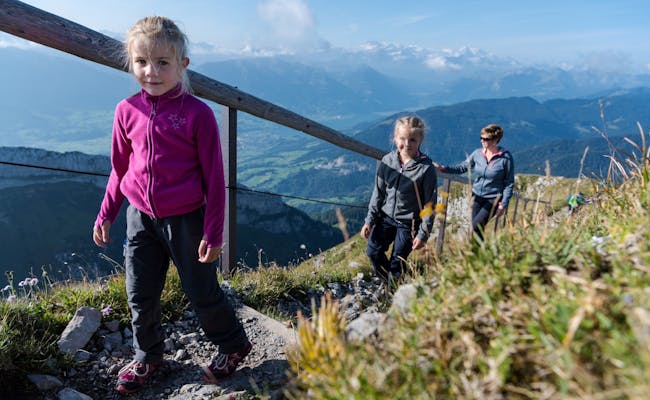 Pilatus Wandern (Foto: (c) PILATUS-BAHNEN AG)
Pilatus Wandern (Foto: (c) PILATUS-BAHNEN AG)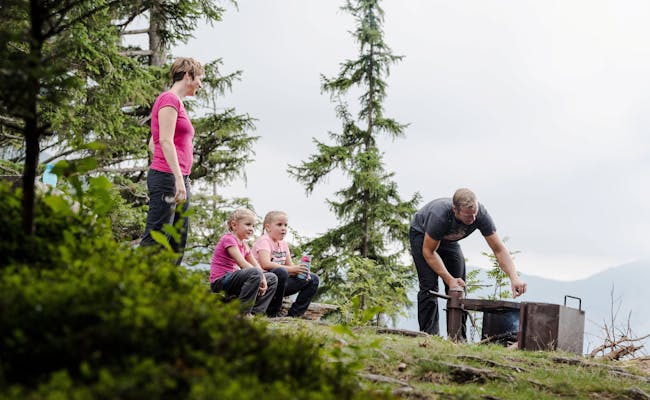 Pilatus Bräteln (Foto: (c) PILATUS-BAHNEN AG)
Pilatus Bräteln (Foto: (c) PILATUS-BAHNEN AG)Riding a mountain bike over Mount Pilatus is very popular. By the way, the Pilatus cable cars do not take bikes and mountain bikes. So you have to drive up yourself to enjoy the bike tour at the top, too. One popular tour starts and ends at the train station in Alpnach. It is 23 kilometers long and takes about 4.5 hours. Just under 1,500 meters in altitude have to be climbed. Along the way, you will pass Lütoldsmatt and Fräkmünt to Pilatus and return via Chli Turren and Niderstad. The mountain paths are sometimes very steep and the last twenty minutes before the summit you even have to push. The descent then also requires strength and skill. Partly the path leads over scree, rocks or roots.
At about 37 km, the route from Kriens via Hergiswald, Lifele, Schwarzenberg, Schachen, Malters, Blatten and Obernau back to Kriens is even longer. This tour is run as Pilatus - DominoTour No. 8. It leads through the wooded Pilatus north foot. Once the ascent altitude is reached, the ride becomes very pleasant. There are not much more than 700 meters of altitude to climb.
Special biker routes have been set up and signaled in the Kriens-Hochwald area.
Mount Pilatus is a challenging flying area for paragliders. A good weather check is therefore absolutely essential before each individual flight. Information can be obtained from the information board at the Pilatus cable car valley station in Kriens and from the Lucerne Paragliding Club.
The wildlife protection areas and controlled airspaces around Mount Pilatus must also be observed. There are several civil and military airfields all around. Therefore, paragliding is only allowed with permission from the tower.
Tandem flights on Mount Pilatus usually start below the Hotel Pilatus Kulm. The flight area is associated with high altitudes and active thermals over Lucerne. The special experience is the fantastic panoramic view of the lake landscape and the mountains.
Offers at Swiss Activities:
 Pilatus Hotel Belle Sonnenaufgang (Foto: (c) PILATUS-BAHNEN AG)
Pilatus Hotel Belle Sonnenaufgang (Foto: (c) PILATUS-BAHNEN AG)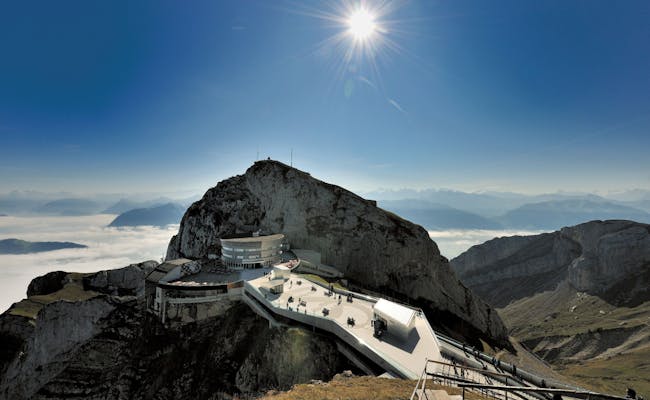 Pilatus Obrhaupt Hotel Bellevue (Foto: (c) PILATUS-BAHNEN AG)
Pilatus Obrhaupt Hotel Bellevue (Foto: (c) PILATUS-BAHNEN AG)Various downhill runs are available for sledging. The ride on the Panorama gondola lift can be purchased as a partial route. However, it is already included in the Pilatus Snow & Fun day ticket.
An easy sledging tour leads over just under five kilometers from Fräkmüntegg to Krienseregg. It has the number 3 and is classified as a blue run.
Also between Fräkmüntegg and Krienseregg, the number 2 toboggan run, which is classified as medium to difficult (red run), leads over three kilometers.
On Krienseregg snowshoes can be rented. Between Krienseregg and Fräkmüntegg there are three marked snowshoe trails. On the way, the beautiful view of Lucerne, Lake Lucerne and the northern foothills of the Alps can be enjoyed with the whole family.
The Snowshoe Trail LU 13 from Fräkmüntegg via Bonere, Mülimäs and Gibelegg to Krienseregg leads downhill. On the way, the route of the gondola lift is crossed. For refreshments, there is the Berghaus Ricketschwändi at about 1,000 meters above sea level. On a length of almost four kilometers, more than four hundred meters of altitude are descended.
The Snowshoe Trail LU 14 leads from Krienseregg via Ricketschwändi and Dorschnei back to Krienseregg. You can stop for a bite to eat along the way at the Bergbeizli Dorschnei. On the five-kilometer-long route, two hundred meters in altitude are overcome in ascent and descent.
The Snowshoe Trail LU 15 starts in Fräkmüntegg and leads via Bonern and Rehlöcher back to Fräkmüntegg. Back at the starting point, you can stop at the Restaurant Fräkmüntegg. This route is about three kilometers long and overcomes about 150 meters of altitude up and down.
In Krienseregg there is a rental station for various snow sports equipment such as toboggans, Ghosky sleds and snowshoes.
Only touring skiers are allowed to transport touring skis or splitboards - exclusively in the equipment trolleys, using ski bags provided for this purpose - from Kriens to Fräkmüntegg. Transport in the gondolas is prohibited. Freeride skiing is prohibited, as alpine hazards such as in particular weather change, avalanches, falling rocks and steep terrain do not allow safe skiing. The toboggan runs may also not be used by skiers.
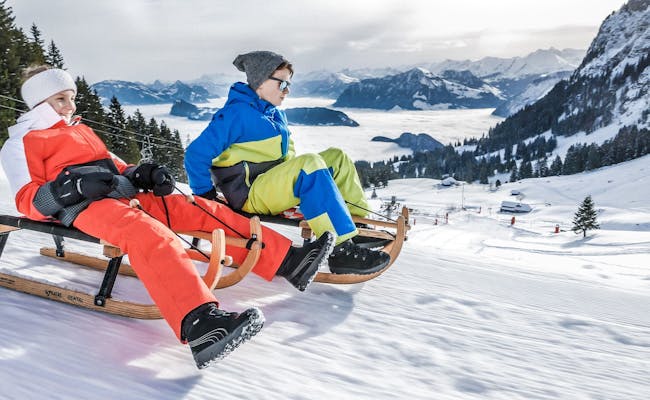 Pilatus Schlitteln (Foto: (c) PILATUS-BAHNEN AG)
Pilatus Schlitteln (Foto: (c) PILATUS-BAHNEN AG) Pilatus Schneeschuhlaufen (Foto: (c) PILATUS-BAHNEN AG)
Pilatus Schneeschuhlaufen (Foto: (c) PILATUS-BAHNEN AG)Special events are always taking place on Mount Pilatus. Be it a nature hike, a look at the stars or a culinary offer.
An ibex colony has been living on Mount Pilatus for around 50 years. Watching these skilled climbers in the wild is a very impressive experience. Experienced old gamekeepers from the region will tell you interesting facts about flora and fauna along the way. The safari can be booked online. The Ibex Safari takes place on fixed dates between June and October in any weather.
Includes:
The impressive evening atmosphere within a unique summit panorama and with a view of Lake Lucerne is experienced in the Bellevue Restaurant. This is accompanied by an exquisite buffet dinner. An overnight stay in one of the hotels on the Kulm is an ideal option.
Astronomy evenings are offered on fixed dates between the beginning of March and the beginning of November. Reservations are essential. Tickets can be purchased online.
Includes:
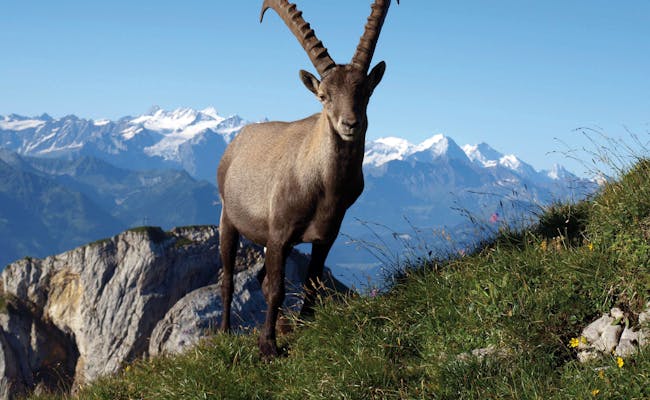 Pilatus Steinbock (Foto: (c) PILATUS-BAHNEN AG)
Pilatus Steinbock (Foto: (c) PILATUS-BAHNEN AG)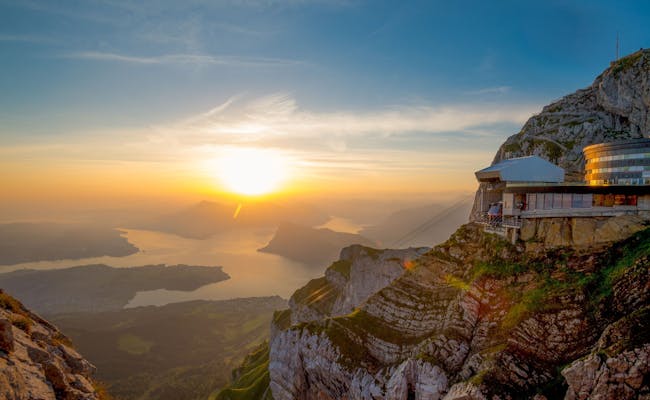 Pilatus Bellevue (Foto: (c) PILATUS-BAHNEN AG)
Pilatus Bellevue (Foto: (c) PILATUS-BAHNEN AG)There are two hotels and a total of six restaurants on Mount Pilatus.
Both hotels on Pilatus Kulm are within easy reach.
This historic hotel was built back in 1890 and was completely renovated in 2010. In addition to 27 superior double rooms, it also offers three junior suites. All rooms have a breathtaking view of the alpine panorama.
The hotel has 20 standard double rooms with comfortable furnishings and a panoramic view of the bays and basins of Lake Lucerne and the Alps.
At Pilatus you will find several restaurants. They offer something for every taste, from particularly exquisite dishes to finger food or chips. They are usually located near the cable car stations. There is a particularly family-friendly restaurant at the PILU Land children's playground.
The restaurant belongs to the Hotel Pilatus Kulm. It consists of three halls and the sun terrace, which alone has 200 seats. The Queen Victoria room seats 120, the Cheminée room seats 60, and the cozy Dohlenstübli with a view of the Alps seats 30. The exquisite dishes served here change seasonally. Groups of ten or more receive an extra menu.
The Steinbock bar serves refreshing drinks and delicious finger food.
The self-service restaurant at Kulm is part of the Hotel Bellevue. It has seating for 120 inside and 200 on the sun terrace. Swiss and international cuisine is served.
On the panorama terrace at the Kulm there is a grill. Here you can get grills and crispy fries.
The mountain restaurant is a self-service restaurant. It offers Swiss cuisine with four different Rösti variations alone. The spicy Drachenrösti is the specialty of the house. It is accompanied by fresh salads from the rich buffet. Homemade fruit cakes and desserts are just right for small and big foodies. There are 120 seats inside and on the terrace. The restaurant is reached via the panorama gondola lift from Kriens in about 30 minutes. From November to April, the popular Sunday brunch is served here; reservations are required.
The Drachenalp is directly accessible from Fräkmüntegg with the Dragon-Glider. The large barbecue area is there to be heated by yourself. At the integrated kiosk meat and baked potatoes are waiting for the grillers. Wine or ice cream can be bought at the kiosk.
This restaurant is especially family-friendly and offers pizza and pasta. Nearby is the PILU-Land playground. The self-service restaurant is right next to the middle station of the Panorama gondola and is ideal for a family outing.
Next to the valley station of the Pilatus cogwheel railroad stands the self-service restaurant with garden restaurant. Here you can buy snacks like homemade paninis or Kernser Hörnli. In addition, there are fine veal paillard and other regional main dishes for the big appetite. The restaurant by the lake also offers Zander-Knusperli, which are very popular. There is room for 100 guests on the sun terrace.
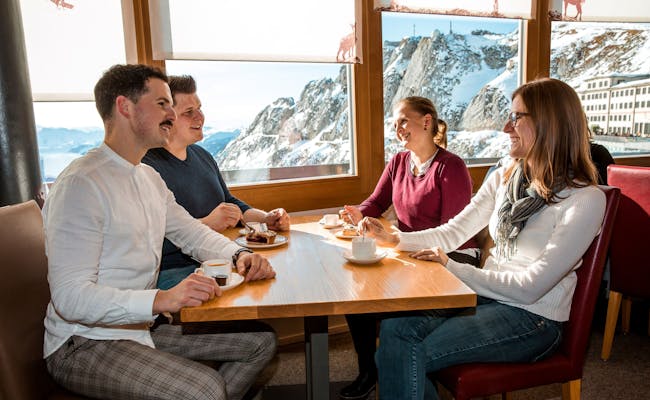 Pilatus Restaurant Bellevue (Foto: (c) PILATUS-BAHNEN AG)
Pilatus Restaurant Bellevue (Foto: (c) PILATUS-BAHNEN AG)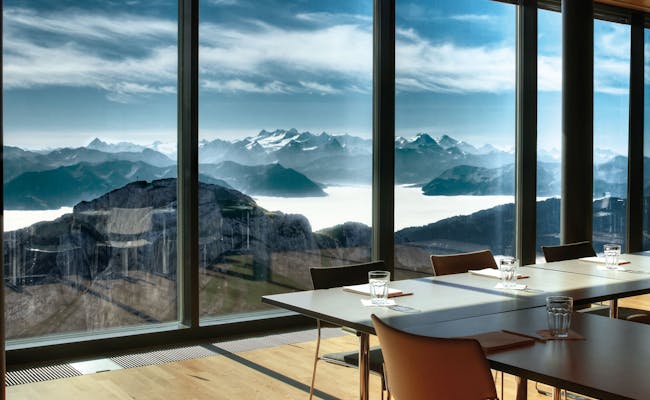 Pilatus Business Center (Foto: (c) PILATUS-BAHNEN AG)
Pilatus Business Center (Foto: (c) PILATUS-BAHNEN AG)Mount Pilatus is very centrally located in Switzerland and is easily accessible from all directions. The valley stations of the mountain railroads are in Alpnachstad and Kriens/Lucerne. Both can be reached directly via freeways, by train, bus or boat.
The train station, boat landing stage and parking lot are right next to the Pilatusbahn valley station.
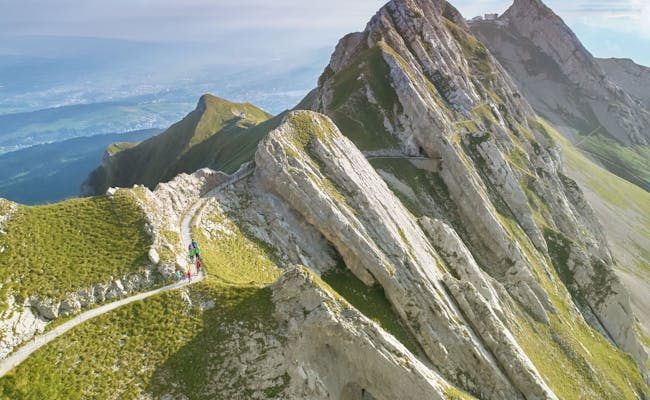 Pilatus Wandern (Foto: (c) PILATUS-BAHNEN AG)
Pilatus Wandern (Foto: (c) PILATUS-BAHNEN AG)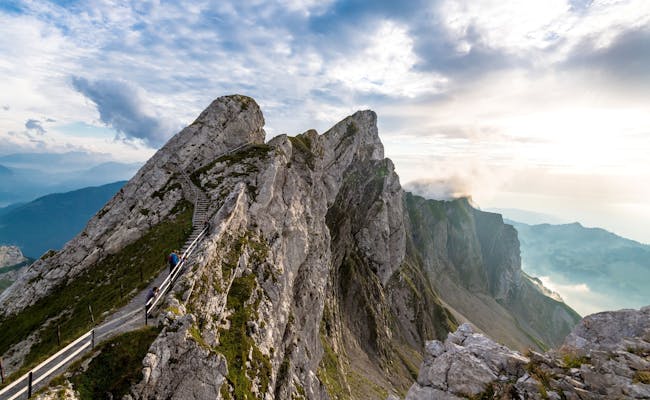 Pilatus Wandern (Foto: (c) PILATUS-BAHNEN AG)
Pilatus Wandern (Foto: (c) PILATUS-BAHNEN AG)